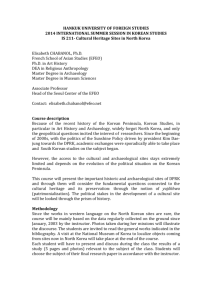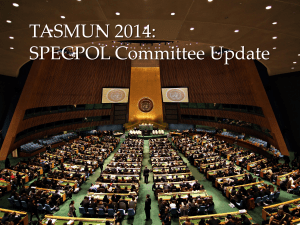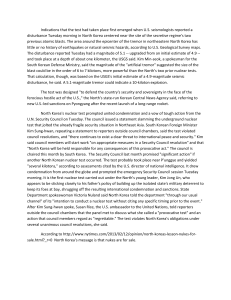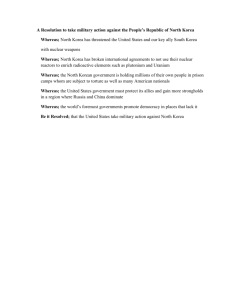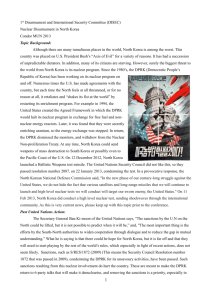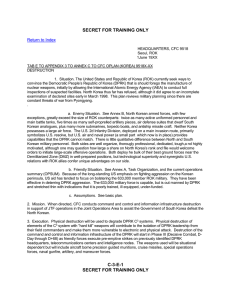DOC - Europa
advertisement
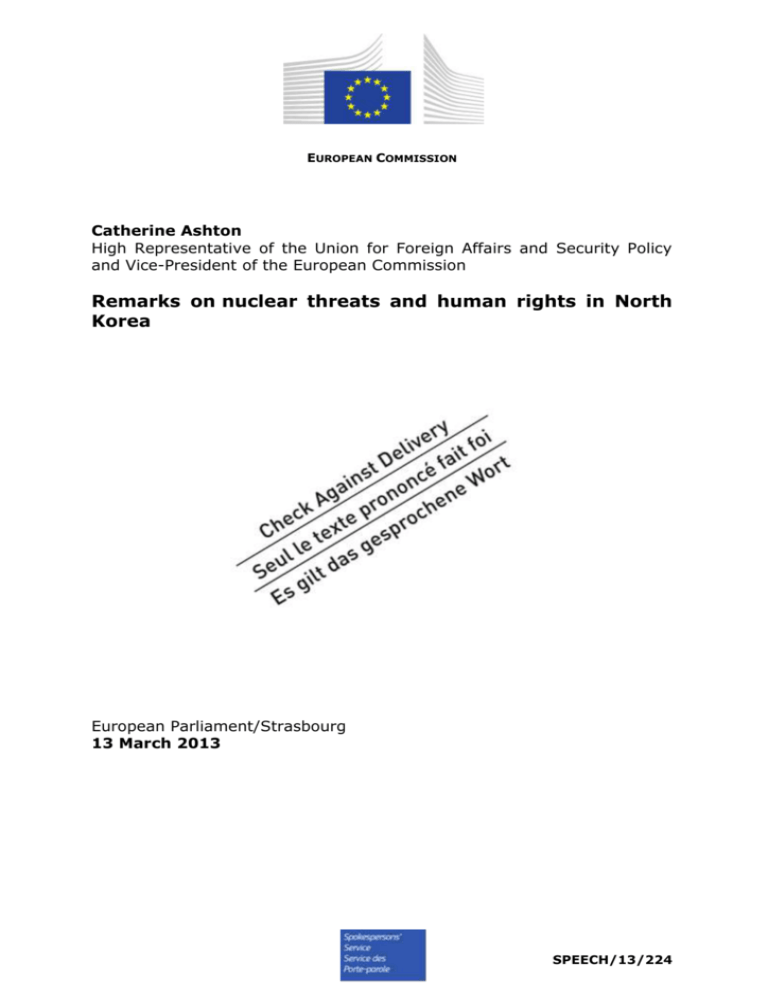
EUROPEAN COMMISSION Catherine Ashton High Representative of the Union for Foreign Affairs and Security Policy and Vice-President of the European Commission Remarks on nuclear threats and human rights in North Korea European Parliament/Strasbourg 13 March 2013 SPEECH/13/224 DPRK remains the most isolated country in the world and one of the most hostile to its neighbours. Its people, apart from a small elite, suffer daily deprivation. Insufficient food supply keeps them dependent on international donors. Despite a third generation of leaders, some inconclusive attempts at economic reform and changed global context, there does not appear to be any positive change. While the people suffer, the regime squanders resources on a large military and on developing sophisticated offensive weapons. The Six Party Talks (6PT), which could offer the country a way out of its isolation, remain stalled. Despite hopes for change under new leadership, North Korea remains determined to continue its long running programme to develop a ballistic nuclear weapon capability. We witnessed a "rocket" launch in December and a nuclear test in February. These provocative actions were followed by a series of threats when the international community protested. We have condemned in strongest possible terms latest nuclear tests. They pose a blatant challenge to the global non-proliferation regime and a serious threat to lasting peace. At the same time we and the United States have consistently made clear that if the DPRK took a path of engagement and positive change, we would respond. I have raised DPRK with my US and Chinese opposite numbers. In particular I have strongly encouraged China to exert pressure on the regime in Pyongyang. This will be high on my agenda when I visit China next month to develop relations with the new leadership. We of course remain in touch with South Korea and the new South Korean administration has expressed clear willingness to adopt a policy of engagement. Honourable Members, you will note Japan has also stepped up its dialogue. The International Community, working through the United Nations Security Council, has shown unprecedented unity in sending clear message to the DPRK: that it will not accept continued violations of the international non-proliferation regime. UN Security Council Resolution 2094 agreed on 7 th of March imposes a range of new restrictive measures, particularly in the financial sector. It makes clear that the UN Security Council will take further action if North Korea continues to flout international rules. I welcome the diplomatic efforts of the US and those of China and Russia which made unity in the UN Security Council possible and who, as immediate neighbours, have important interests at stake. We have strongly and consistently supported 6 Party Talks over the years. We have economic and security interests in the region. We have supported the UN regime and systematically imposed sanctions following the Security Council Resolutions after the nuclear tests in 2006 and 2009 and more recently December 2012 and February 2013. After the most recent events, we have prepared new measures in line with the UNSC Resolution: a ban on key components for the ballistic missile sector, trade on conventional arms and some financial transactions by the North Korean Central Bank and other government bodies. 2 We remain determined to take action in response to new provocations – the latest of which is North Korea's unilateral declaration that the 1953 armistice is 'invalid' and leader Kim Jong-Un threat to "wipe out" a small South Korean island, as a priority target in the event of military conflict. Honourable Members, this sort of provocation is totally unacceptable and this is precisely the reason why the 18 February FAC adopted a new package of restrictive measures, which further reinforced the measures adopted by the Security Council on 22 January. We remain deeply concerned about Human Rights situation in North Korea. The EU will co-sponsor a Resolution with Japan in the Human Rights Council in Geneva on establishing a Commission of Enquiry into human rights violations in the DPRK. Meanwhile, we have provided assistance to people in North Korea on purely humanitarian grounds. In 2011 we provided € 10 million to respond to urgent food needs channelled through the World Food Program. This assistance was directed to the most vulnerable people to improve the feeding of children under five in orphanages, pregnant women, elderly and disabled people. We will continue to assist the UN in its efforts to keep the international community united. This is the only way we can uphold the non-proliferation regime and support the people in North Korea. 3


